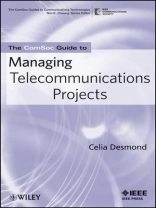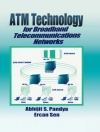This pocket guide provides an overview of the telecommunications environment as it has evolved over the past few years, illustrating the need for project management, the significance of project success to the companies, and the application of key project management processes within the telecom environment. Topics covered include: scope management, time management, cost management, procurement management, risk management, communications, quality, human resources, and Integration. It offers professionals a brief and accessible guide to managing telecommunication projects in the 21st century.
Tabla de materias
Preface ix
Acronyms xiii
Chapter 1 Evolution of The Telecommunications Industry 1
Monopoly Status 1
Competition for Long Distance Services 3
Competition for Local Services 4
Competition Starts to Spread 5
Internet and Multimedia Disrupt the Basic Networks 6
A New Telecom Environment 7
What About the Future? 10
Chapter 2 Why is PM Important, Especially in Telecommunications? 11
Team Diversity 11
Resource Limitations 12
Time Constraints and Limitations 12
Risk Management 12
Ensuring Quality 12
Scope Definition 13
Project Objectives 15
What About Telecom Projects? 17
Tehnologies 17
Services 18
Companies in the Business 18
Regulatory Environment 18
Successful Business Model 19
Internal Corporate Structures 19
Customers 19
The Best Way to Market 20
Service Models 20
Network Architecture 20
Conclusion 21
Chapter 3 Project Management Basics 25
Integration 31
Project Scope Management 32
Time Management 32
Cost Management 32
Procurement Management 33
Risk Management 33
Communications Management 33
Human Resources Management 34
Quality Management 34
Chapter 4 Getting Started on Your Project 37
Why Do Projects? 37
The Requirements 41
What Happens Before the Team Arrives? 42
Setting Project Objectives 44
General Description, Skills Analysis, and Stakeholders, and Risk Analysis 44
Chapter 5 Who Is Involved? 45
Project Sponsor 45
Stakeholders 46
Management 48
Functional Managers 48
The Type of Company Hosting the Project 49
Chapter 6 Setting Business and Project Objectives 51
SMART Objectives 52
Specific 53
Measurable 53
Achievable 53
Realistic 54
Time-Bound 54
Chapter 7 What Is to be Included? 55
Building the Charter 55
Scope Description 56
Scope Management Plan 64
Where Will the Resources Come From? 70
The Work Breakdown Structure 71
Chapter 8 Going Outside the Company for Products and Services 77
Definition of Requirements 78
Solicitation 78
RFI 78
RFP 80
RFQ 83
Vendor Selection 83
Contract Management 83
Chapter 9 Managing Risk in Telecom Projects 85
Risk Management 85
Contingency is Expected to be Spent 94
Chapter 10 Who Tells What to Whom? 97
Communications Management 97
General Communications 98
Chapter 11 Creating the Timelines 103
Task Duration 103
Dependencies 104
Finish–Start Dependency 105
Start–Start Dependency 105
Finish–Finish Dependency 105
Start–Finish Dependency 105
Mandatory and Discretionary Dependencies 108
Lags and Leads 108
Project Logic Diagram 109
Critical Path 112
Forward Pass 114
Backward Pass 116
Float 117
Showing the Schedule 118
Including Contingency 118
Collapsing the Schedule 121
Effort-Driven and Duration-Driven Tasks 122
And then . . . 123
Chapter 12 Managing the Costs 125
Types of Costs 127
Profitability Measures 128
Estimating the Costs 130
Project Budgets and Planning the Project Cost 132
Managing the Costs 139
Project Communications Planning and the Communications Matrix 139
Status Reporting 141
Meetings 142
Preparing the Agenda 143
Inviting the Right People 144
Informing the People of Their Roles at the Meeting 146
Using the Meeting Time Effectively 147
Motivating People to Communicate Properly 150
Electronic Tools for Communications 150
Monitor and Control 151
Some Suggestions 152
Chapter 13 Managing the Developments 155
Chapter 14 Managing the People 163
Organization Structures for Projects 164
Management Styles 167
Autocratic 168
Paternalistic 169
Democratic 169
Laissez-faire 169
Leadership 170
Team Building 172
Motivation 174
Conflict 175
Learning Organization 177
Managing the Workloads of the Team Members 178
Some Suggestions for Good Participation and Good Management 178
Chapter 15 What Is the Gain? 181
Good People 181
Understanding the Value of the Product 182
Clear Project Objectives 182
Clearly Defined Scope 182
Good Planning 183
Strong Change Control 183
Well-Connected Team 184
Effective Communication 184
References 185
Index 187
Sobre el autor
Celia Desmond is President of World Class Telecommunications, which provides training in management skills in business and telecommunications engineering environments. She is the project manager for the IEEE Communications Society Certification in Wireless Communications Engineering Technologies. Desmond has taught project management at four universities. A past president of IEEE Communications Society and past vice president of IEEE Engineering Management Society, Desmond has lectured internationally on programs for success. She is a Senior Member of IEEE.












